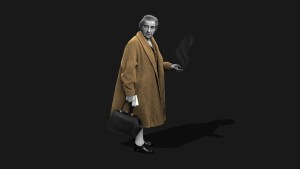Podcast: Play in new window | Download
By Sean Graham
Golda will begin its theatrical run at the Hot Docs Ted Rogers Cinema in Toronto on January 3. You can watch the trailer here and find showtimes here.
 In March, 1969, a then 70-year old Golda Meir came out of retirement to serve as Israeli Prime Minister following the sudden death of Levi Eshkol. The country’s first female Prime Minister, Meir was dubbed the ‘Iron Lady’ of the Middle East. During her five years in office, Israel experienced several events that continue to influence public opinion and policy, including the Munich Massacre during the 1972 Olympics and the Yom Kippur War in October 1974. As a Canadian historian, I haven’t read extensively about Meir’s tenure, but whenever it has come up, it has generally been presented in a positive light. It was only recently that I learned that her legacy has been the subject of much debate.
In March, 1969, a then 70-year old Golda Meir came out of retirement to serve as Israeli Prime Minister following the sudden death of Levi Eshkol. The country’s first female Prime Minister, Meir was dubbed the ‘Iron Lady’ of the Middle East. During her five years in office, Israel experienced several events that continue to influence public opinion and policy, including the Munich Massacre during the 1972 Olympics and the Yom Kippur War in October 1974. As a Canadian historian, I haven’t read extensively about Meir’s tenure, but whenever it has come up, it has generally been presented in a positive light. It was only recently that I learned that her legacy has been the subject of much debate.
That’s why I was so intrigued by the new documentary Golda, which explores Meir’s life and career. Starting with previously unseen footage from a mid-1970s television interview, the film delves into Meir’s political ambitions, worldview, and approach to the major issues she confronted during her time as Prime Minister. In doing so, it provides ample space for both her critics and supporters to present their rather divergent perspectives on her time in office. Making effective use of archival footage and contemporary interviews, the film allows the viewer to come to their own conclusions about Meir while situating her, her detractors, and her allies within the context of the time. What is most striking about the film is the lengths it goes to humanize all its characters. It is not interested in lauding or demonizing, but rather telling the story of this contentious period from a human perspective.
In this episode of the History Slam, I talk with Udi Nir, one of the directors of Golda. We talk about the film’s point of view, the discovery of the previously unseen footage, and collecting first-hand accounts. We also chat about Meir’s legacy and the very different reactions of audiences in Israel and the United States.
Sean Graham is a historian with Parks Canada, an Adjunct Professor at Carleton, and a contributing editor to Activehistory.ca.
This work is licensed under a Creative Commons Attribution-NoDerivatives 4.0 International License. Blog posts published before October 28, 2018 are licensed with a Creative Commons Attribution-NonCommercial-ShareAlike 2.5 Canada License.